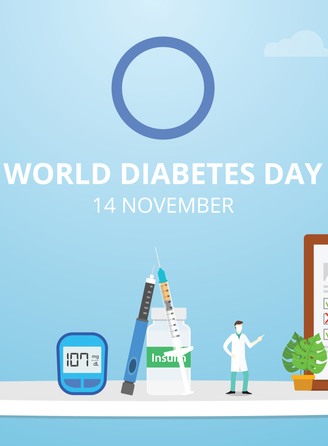New Link Discovered Between Diabetes Onset and Risk of Dementia
By Adam Hochron
May 6, 2021
Patients who develop type 2 diabetes at an early age are known to be at risk of various vascular complications, but a recent study found they may also be at greater risk of developing dementia.
A longitudinal study of patients in the United Kingdom reviewed the data of more than 10,000 patients over three decades. According to results published in JAMA, the researchers identified 1,710 cases of diabetes and 639 cases of dementia over a median follow-up period of 31.7 years. The authors noted that dementia rates per 1000 person-years for participants without diabetes were 8.9 at 70-years-old. The rates for people with diabetes were 10 per 1,000 person-years with diabetes onset up to five years earlier. Then, the rates increased to 13 for 6 to 10 years earlier and 18.3 for more than 10 years earlier.
“At age 70, every 5-year younger age at onset of type 2 diabetes was significantly associated with an HR of dementia of 1.24 (95% CI, 1.06-1.46) in analyses adjusted for sociodemographic factors, health behaviors, and health-related measures,” the authors said. 
With cardiovascular comorbidities already a known risk, the authors evaluated any possible connection dementia might have in patients with these issues as well. According to the authors, compared to those with diabetes alone, patients who also had a stroke had a significantly higher risk of developing dementia (dementia rate, 24.32/1000 person-years; HR, 2.17 [95% CI, 1.05-4.48]). The hazard ratio was 4.99 (95% CI, 2.19-11.37) in patients with all three conditions (dementia rate, 77.77/1000 person-years), though the authors noted these results were based on a small number of findings.
The authors noted that another key finding in their research was the lack of a robust association of dementia with preclinical diabetes or the FINDRISC in patients without diabetes regardless of their age at the time of assessment. Despite their findings, the authors noted that the “precise mechanisms” underlying the connection between type 2 diabetes and dementia were still unclear.
“There are several possible explanations for the association between type 2 diabetes and dementia,” the authors said. “One hypothesis is that brain metabolic dysfunction is the primary driver of Alzheimer disease, highlighting the role of decreased transport of insulin through the blood-brain barrier, impairments in insulin signaling, and consequently decreased cerebral glucose utilization.”
Another possible hypothesis cited by the authors is the role of microvascular dysfunction, which could lead to issues like inflammatory and immune responses, increased blood-brain permeability, and altered blood flow regulation.
While citing several strengths of the study, the authors also acknowledged a few limitations, including the inability to distinguish dementia subtypes, which they said, “precluded estimation of the association of diabetes with Alzheimer disease and major subtypes of dementia such as vascular dementia.”
The authors said continued follow-up on their findings will help them better understand the importance of the age of type 2 diabetes onset as it relates to dementia.















.jpg)






















